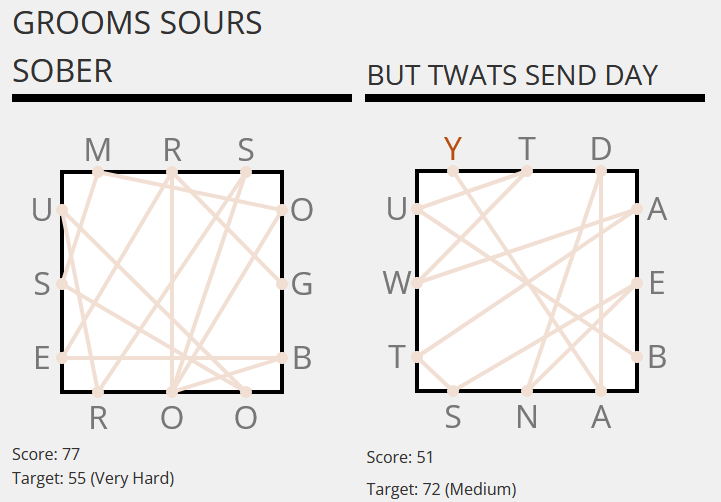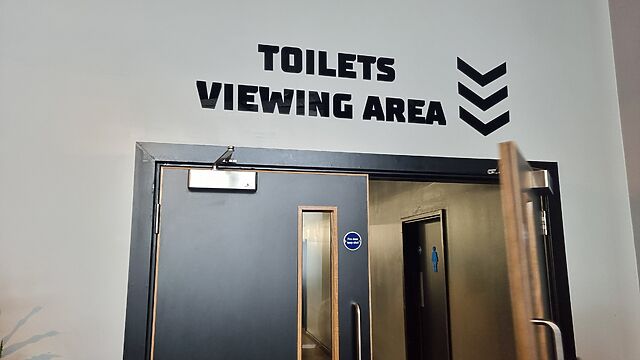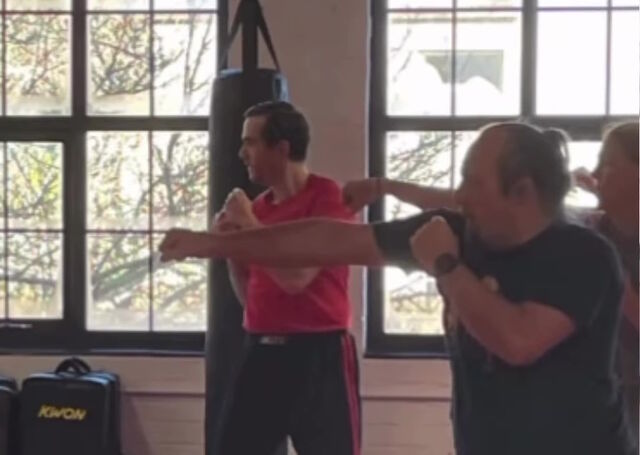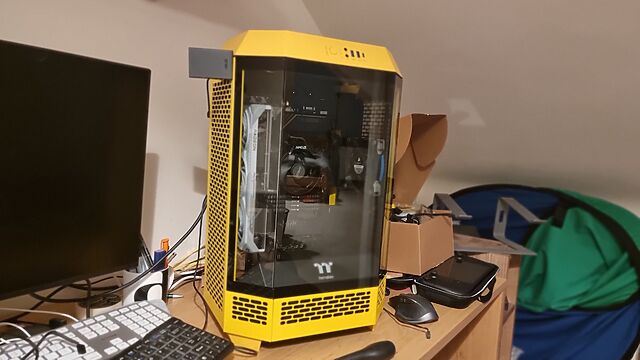I’ve been enjoying playing Chain Words, from eclectech, intermittently, since it came out in November (when I complained that the word ‘TOSSPOT’ was rejected; I don’t know if this obvious omission has yet been corrected). If you’ve not given it a go yet, and you like a word game that’s “a bit different”, you should try it!
Blog
Imajica by Clive Barker
 Clive Barker’s Imajica has long been one of my favourite fantasy novels. The heft
of the single-volume edition renders it both unwieldy and intimidating, which is probably why my most recent reading of it was only the fourth time I’ve enjoyed it from
cover-to-cover. But enjoyed it I did, and I’m sure I’ll pick it up again in a further decade or so for another adventure.
Clive Barker’s Imajica has long been one of my favourite fantasy novels. The heft
of the single-volume edition renders it both unwieldy and intimidating, which is probably why my most recent reading of it was only the fourth time I’ve enjoyed it from
cover-to-cover. But enjoyed it I did, and I’m sure I’ll pick it up again in a further decade or so for another adventure.
I’m aware that it draws comparison to his perhaps more-widely-read Weaveworld, but somehow that never did it for me in the same way. Perhaps my mistake was reading Imajica first, way back when I was a teenager, and so satiating my appetite for “curious flawed everyman explores adjacent reality alongside magical woman, faces horrors”; just an unfortunate coincidence that I picked up Weaveworld right after!
I also fully accept the critics who observe that it’s exceptionally drawn-out, at times. But where it does seem to drag, it does so with a certain gravity; an inertia: the slower parts of the story are full of intention, and meaning, and – frequently – foreshadowing. I still find new expressions of its themes in it, each time I read it. This time around, for example, I found myself finding a plethora of reflections of protagonist Gentle’s role as a forger: unable to create anything novel as an artist (for reasons that become apparent in the long run) but only able to copy beautiful things belonging to others. This self-inflicted curse shows up again and again in innumerable subtle ways before the truth of it is (finally, eventually – did I mention how weighty this fat book is?) exposed… and with such an epic tale it’s little wonder that it’s impossible to remember all of the indications that preceded it!
I’ve long appreciated how Imajica plays with gender and, to a lesser-extent, relationships and sexuality, in a way that was revelatory for me on a first reading and which with the benefit of hindsight I can see is incredibly progressive for its age. Gentle and Judith exist each to further the plot in their own ways, not as romantic “goals” for one another… despite not only tropes in the genre but also the ways in which their characters are presented within their world – by which I mean: this isn’t a story about how they “get together at the end”, and that subverts both the expectation of how they’re introduced in the writing and also the destinies with which their characters seem to be imbued. Pie’o’pah presents, depending on the circumstance, as either male or female but also as some other gender entirely. Gender is a huge overarching theme, with a oppressive patriarchal power that’s threatened by a mysterious feminine energy playing a key role that, like everything else, is quietly echoed throughout the novel.
But perhaps my favourite part of this wonderful book is its world-building, which – through the eyes of an outsider – paints a rich picture of each of several fantastical dominions. Over the course of the adventure a character draws a map to chart the wonders of the story’s universe, but it’s ultimately incomplete (and perhaps impossible to complete). That’s what it feels like to me as a reader, too: like being given a glimpse of a wider and even-more-wonderful world just beyond the horizon: a fantastical creation too large to ever fully comprehend. While retaining a focus on the story of three-or-so core characters, Barker teases us with the idea that there’s “something more” just beyond our peripheral vision. And that’s flipping amazing.
Note #27909
Note #27906
The younger kids’ taekwondo school put on a free ‘new years workout’ class this morning. It was pretty awesome.
My watch says my heart rate averaged 146bpm, peaking at 169bpm. It’s possible I’m not as fit as I used to be. 😅
But at least I don’t feel like I might die, like I did during the ‘dads go free’ promotion last year. Progress?
Why I Am So Tired [Video]
This post is also available as an article. So if you'd rather read a conventional blog post of this content, you can!
This is the video version of a joke that’s also available as a blog post and as a podcast episode. Watch it here, or find it:
- on YouTube (also as a “short”, for people who are too lazy to rotate their phone screen to horizontal and/or don’t have the attention span for more than three minutes of content)
- on Facebook
Why I Am So Tired
Podcast Version
This post is also available as a podcast. Listen here, download for later, or subscribe wherever you consume podcasts.
This post is also available as a video. If you'd prefer to watch/listen to me talk about this topic, give it a look.
I am tired. For a couple of years I’ve been blaming it on iron-poor blood, lack of vitamins, diet, and a dozen other maladies. But now I’ve found out the real reason: I’m tired because I’m overworked.
The population of the UK is 69 million1, of which the latest census has 37 million “of working age”2.
According to the latest statistics, 4,215,913 are unemployed3, leaving 32,784,087 people to do all the work.
19.2 million are in full time education4, 856,211 in the armed forces5, and collectively central, regional, and local government employs 4.987 million6. This leaves just 12,727,876 to do all of the real work.
Long term disabilities affect 6.9 million7. 393,000 are on visas that prohibit them from working8, and 108,0859 are working their way through the asylum process.
Of the remaining 339,791 people, a hundred thousand are in prison10 and 239,789 are in hospital11.
That leaves just two people to do all the work that keeps this country on its feet.
You and me.
And you’re sitting reading this.
This joke originally appeared aeons ago. I first saw it in a chain email in around 199612, when I adapted it from a US-centric version to a more British one and re-circulated it among some friends… taking the same kinds of liberties with the numbers that are required to make the gag work.
And now I’ve updated it with some updated population statistics13.
Footnotes
1 Source: Provisional population estimate for the UK: mid-2025, Office for National Statistics.
2 Source: Working age population, gov.uk.
3 Source: Unemployment, Office for National Statistics.
4 Source: Statistica for all the children, plus FE students from Education and training statistics for the UK, gov.uk, with some rounding.
5 Source: Hansard, here, plus other sources from the same time period.
6 Source: this informative article.
7 Source: UK disability statistics: Prevalence and life experiences, House of Commons Library.
8 Source: Reason for international migration, international students update: May 2025, Office for National Statistics.
9 Source: How many people claim asylum in the UK?, gov.uk.
10 Source: Prison population: weekly estate figures 2025, gov.uk.
11 Source: Bed Availability and Occupancy, Hansard Library.
12 In fact, I rediscovered it while looking through an old email backup from 1997, which inspired this blog post.
13 Using the same dodgy arithmetic, cherry-picking, double-counting, wild over-estimations, and hand-waving nonsense. Obviously this is a joke. Oh god, is somebody on the satire-blind Internet of 2026 going to assume any of these numbers are believable? (They’re not.) Or think I’m making some kind of political point? (I’m not.) What a minefield we live in, nowadays.
Bee
As part of my efforts to reclaim the living room from the children, I’m building a new gaming PC for the playroom. She’s called Bee, and – thanks to the absolute insanity that is The Tower 300 case from Thermaltake – she’s one of the most bonkers PC cases I’ve ever worked in.
Visualising Forged In The Dark probabilities
I was having trouble visualising the dice probabilities for some Forged in the Dark-based1 RPGs2, so I drew myself a diagram. I don’t know who, if anybody, would be interested in such a thing other than me… but that’s why we put these things online, right?
The general idea for Forged in the Dark action resolution is that you throw a number of six-sided dice representative of your chance of success3. You look at the highest value rolled in your dice pool, typically with most or all of the following effects:
- 1-3: Failure – depending on the circumstances you might be able to try again (with greater risk) and/or suffer some kind of consequence (a “harm” or “complication”).
- 4-5: Limited success – you succeed, but with come kind of consequence.
- 6: Success – you succeed!
- Multiple 6s: Critical – you succeed, and it’s more-effective than you’d hoped or you gain some other benefit4.
If you’re playing Blades in the Dark or another Forged in the Dark-based game and find it useful to visualise how likely you are to get screwed-over by the dice… you’re welcome!
Footnotes
1 Forged in the Dark is the name of the permissively-licensed SRD originally used for fantasy RPG Blades in the Dark, but it’s been used in plenty of other places too where its relatively fast-and-loose mechanics are best-suited. Sharp-eyed readers might have noticed this come up in a repost from last week, too…
2 I may or may not be considering Forged in the Dark as the engine for a prototype RPG environment I’ve been half-heartedly constructing this winter…
3 A task for which you’ve prepared and have trained, in an area in which you’re skilled, and for which you’re well-equipped (e.g. an accomplished thief takes the time to carefully pick a basic lock using fine tools) is likely to involve rolling more dice than a less-fortunate individual.
4 I’m hugely grateful to AnyDice for helping with these calculations. Did you know that you need to be rolling ten six-sided dice before it becomes more-likely-than-not that there’ll be a double-six somewhere in there?
A small collection of text-only websites
This is a repost promoting content originally published elsewhere. See more things Dan's reposted.
…
I’m not saying the plain-text is the best web experience. But it is an experience. Perfect if you like your browsing fast, simple, and readable. There are no cookie banners, pop-ups, permission prompts, autoplaying videos, or garish colour schemes.
I’m certainly not the first person to do this, so I thought it might be fun to gather a list of websites which you browse in text-only mode.
…
Terence Eden’s maintaining a list of websites that are presented as, or are wholly or partially available via, plain text. Obviously my own text/plain blog is among them, and is as far as I’m aware the only one to be entirely presented as text/plain.
Anyway, this inspired me to write a post of my own (on text/plain blog, of course!), in which I ask the question: what do we consider plain text? Based on the sites in the list, Markdown is permissible as plain text, (for the purposes of Terence’s list), but this implies that “plain text” is a spectrum of human-readability.
If Markdown’s fine, then presumably Gemtext would be too? How about BBCode? HTML and RTF are explicitly excluded by Terence’s rules, but I’d argue that HTML 1.0 could be more human-readable than some of the more-sophisticated dialects of BBCode (or any Markdown that contains tables, unless those tables are laid-out in a way that specifically facilitates human-readability)?
As I say in my post:
<-- More human-readable Less human-readable --> |-----------|-----------|-----------|------------|-----------|-----------|-----------|-----------| Plain text Gemtext Markdown BBCode HTML 1.0 Modern HTML RTF
This provocation is only intended to get you to think about “what does it mean for a markup language to be ‘human readable’?” Where do you draw the line?
Tintern Abbey
Invisible Dog
Dan Q found GC47WME PYVW- Cuckoo Wood
This checkin to GC47WME PYVW- Cuckoo Wood reflects a geocaching.com log entry. See more of Dan's cache logs.
I was in these woods anyway, seeking GC10N80 (which, incidentally, is one of the best geocaches I’ve ever logged and well worth the attention of anybody ‘caching in this part if the world) and figured I’d come hunt for this cache too.
A quick find; my geosense spotted a candidate hiding place right from the main path, and I turned out to be right.
Cache contents are in somewhat poor condition: logbook has soaked and dried again into a slab of papier-mache and was challenging to sign!
TFTC!
Dan Q found GC10N80 Wye Eye
This checkin to GC10N80 Wye Eye reflects a geocaching.com log entry. See more of Dan's cache logs.
I’m on a family holiday, staying over in Catbrook, and I have a holiday tradition of getting up early (before the kids are up!) to come out on geocaching jaunts.
I very nearly didn’t consider this at all. It’s fake location, nestled amongst challenge caches (which I have no interest in whatsoever), made me initially suspect it would be another of the same. It’s only a lucky coincidence I clicked on it at all!
(Maybe that’s why this cache had no finds in 2025? Such a shame!)
But I’m glad I did. I puzzled over the riddle for a little while before the “odd line out” made me think of something. So confident was I in the resulting coordinates that I didn’t even visit the special web page to double-check, which meant I missed out on the object hint until I was in the field and needed one! This, in turn, was pretty satisfying!
I saved this cache for my second morning’s outing: free one on which I didn’t bring the dog (for whose little legs this hike might have been too intense). This was the right choice. I had to ford a flooded and frozen path by moonlight near Cleddon before a visit to the waterfalls (and the associated cache) then pressed on up into the woods to uncover this cache, which has sat alone and undisturbed for, what… 20 months?

It’s in fine condition and in an absolutely postcard-perfect spot. The sun was at long last creating the hills on the far side of the valley as I signed my name and returned the box to its hiding spot. I really regret that this cache doesn’t see more footfall, and I hope that this effusive log (and the accompanying Favourite Point) might go some way to helping rectify that situation!
TFTC. It’s one of the best I’ve ever found. If I could award it two FPs I would!
Dan Q found GC39NPC Cleddon shoots and falls
This checkin to GC39NPC Cleddon shoots and falls reflects a geocaching.com log entry. See more of Dan's cache logs.
Hiked over from Catbrook on the way to a cache up Pen Y Fan and stopped by these beautiful waterfalls on the way. So glad I did! I’d originally planned to seek this cache on my return journey but I’ve got to say: it looked extra spectacular by the light of the full supermoon.
And as a bonus(?) I spent long enough hunting for the cache that I got to see it in daylight too!
The primary problem came from the fact that the path that the cache is nearest… is closed! Apparently a tree has fallen somewhere and rendered it unsafe, though that’s probably a long way from where the cache is hidden.
The secondary problem was that I didn’t read the sign. I just saw the fence, assumed that what I was looking at wasn’t the (closed) path but something completely out of bounds, and focused my search exclusively elsewhere. My GPSr had been fritzy all morning, so being “out” by 10-15m didn’t seem like a big deal.
It was only when I was considering returning during daylight hours that I stopped to read the sign and realised where the hinted path was: it’d been right in front of me the whole time! I quickly skirted the blockade and found the cache, then took the time – having already bypassed the fence – to snap a happy selfie by the falls in the early light.
Awesome adventure to a fabulous spot. FP awarded!
D&D 5e is not for everyone
This is a repost promoting content originally published elsewhere. See more things Dan's reposted.
…
In summary, 5e is for you if you
- already use the system & don’t like learning new things,
- enjoy medieval fantasy settings, with a 60-70% combat tilt,
- like vague, unopinionated systems,
- don’t mind overly corporate media,
- just kinda like it (which is totally fair)
And if you do fit the bill here, I truly do wish you all the best in your 5e adventures…
But just because one system is for you, doesn’t mean others aren’t! pulls away curtain, exaggerated
…
As a quick disclaimer, this hobby, like many others, is a matter of taste. I, like everyone else, am biased towards a certain kind of game. Specifically, I absolutely adore games that place roleplay at center stage. Games that deal with the complexities of identity. Games with innovative mechanics. Games that present deep ethical quandaries. Games that make everyone at the table ponder something meaningful. If you like similar games, you’ll probably love my recommendations. If you don’t, then don’t worry! There are so many more games out there that will be for you and not for me, (5e included!), and I absolutely love that about this hobby.
I listed a good few options above, but also, I’d encourage you to take a gander at a few of the following games, most if not all of which I will write full reviews for eventually:
Spire: Rise against the oppressive high elves in a revolution destined for ruin, in an attempt to make a difference. Check out the fallout system in this one, it’s genuinely a game changer.
Blades in the Dark: Gang warfare: the game. Run a gang in a dark, steampunk, ghost-ridden world, and execute sick heists. Prep is for losers when in-scene you can just flashback to that time you prepared for this exact eventuality.
Slugblaster: TEENS ON HOVERBOARDS! DOIN’ SICK TRICKS! GOIN’ THROUGH PORTALS! GETTIN’ THAT SWEET SWEET INTERNET CLOUT! RUNNIN’ FROM INTERDIMENSIONAL POLICE! YEAHHHHHHHHHHHHHHHHH!!!!!!!!
Lichcraft: You’re trans and the wait for gender affirming healthcare is 300 years. Welp time to turn to the dark arts and become a lich!
It saddens me a little that D&D (5e or whatever) is so-firmly entrenched as “the” default choice of TTRPG.
It’s fine, I guess (with the caveats above about what it’s best at and, by proxy, what it’s weaker at), and I’ve on many occasions enjoyed D&D both as a PC’s player and as a DM. But that it’s so much the de-facto standard that D&D is in many circles synonymous with roleplaying is… just a bit of a waste, really!
I love that Kai not only shares an explanation of these limitations but that they also go on to share a handful of recommendations of other games to consider, the next time the TTRPG itch gets you! I’d heard of Blades in the Dark (perhaps courtesy of the use of the Forged in the Dark engine in other games; I’m not certain), but the other three are completely alien to me… and they all sound great in different ways.
I wonder if I can persuade some Abnibbers to hook up for a mini-campaign/one-shot of Slugblaster or something at some point? Spire sounds great too, and I like the theme of Lichcraft: there’s some interesting ideas to explore in that universe!






